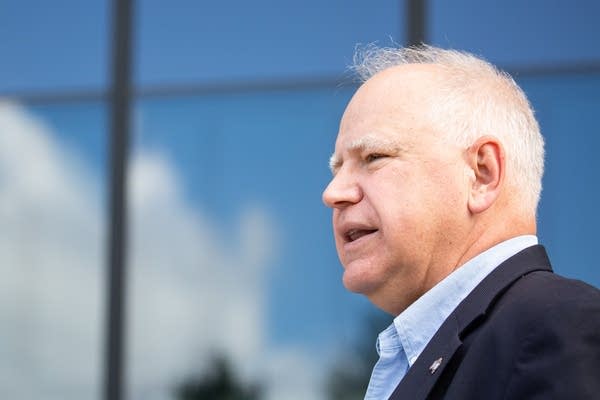Walz on pandemic, policy priorities as new year begins

Go Deeper.
Create an account or log in to save stories.
Like this?
Thanks for liking this story! We have added it to a list of your favorite stories.
Many Minnesotans are returning to work and school on Monday against the backdrop of the fast-spreading omicron coronavirus variant. That includes Gov. Tim Walz, who spent the Christmas holiday isolating after he and other members of his family tested positive for COVID-19.
MPR News host Cathy Wurzer spoke with Walz about his recovery, the latest in the state’s pandemic response and his policy priorities heading into this election year.
Walz said testing shortages are going to be a reality for the foreseeable future.
“I think the good news is now is that people are using it, they understand this test is important. The bad news is the supply chains are still strained nationally,” he said. “And I appreciate the federal government making the commitment on 500 million at-home tests, where a lot of states never did this and weren't doing the mail-in, at-home test. The problem is that 500 million means that's coming out of our supply chains.”
Turn Up Your Support
MPR News helps you turn down the noise and build shared understanding. Turn up your support for this public resource and keep trusted journalism accessible to all.
The governor also asked for patience and encouraged people to continue trying to get tested, despite the difficulties. And to wear masks in public, noting that the CDC is recommending people to no longer rely on cloth masks because of the increased transmissibility of the omicron variant.
“Whether it's the pharmacies, the at-homes, the state tests — continue to do this. It's the right thing to do,” he said. “And once again, even if you're feeling just mild symptoms and it feels like it might be a cold, like which in our case was. The test proved that it was COVID, which allowed us to isolate.”
Walz says he aims to find some common ground with legislative Republicans when they convene in four weeks. He hopes the state's expected budget surplus can refill a depleted unemployment insurance trust fund and fund some initiatives that can help both families and employers.
“Businesses are asking us to look very, very carefully at reducing the cost of child care. And a lot of businesses, especially small businesses, recognize paid family leave is already a benefit that’s paid in larger companies that they can't compete with in smaller companies,” he said “If the state helps out, much like unemployment insurance, we can make them more competitive. That attracts and retains workers, and it helps those businesses.”
Republicans have been talking about tax cuts as their top priority heading into the session, which is not a budget-setting session this year.
Use the audio player above to listen to the full conversation.


